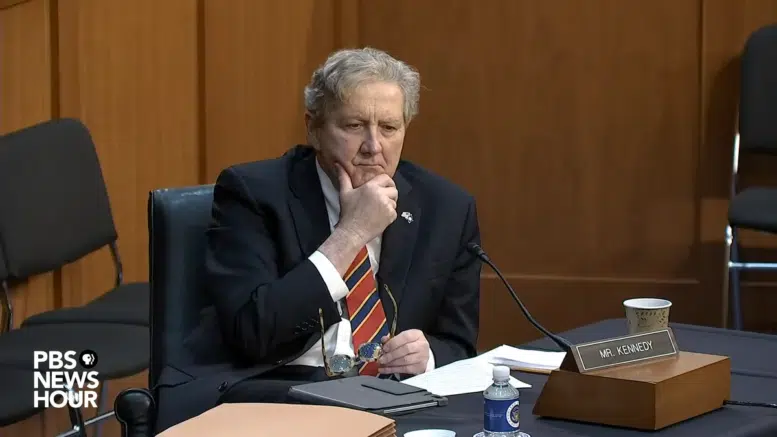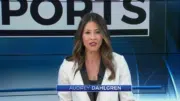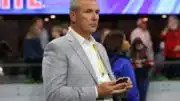Sen. John Kennedy (R-La.) summed up the problem with the never-ending congressional hearings regarding name, image, and likeness (NIL) and the current state of college sports. They are disingenuous. The NCAA has been a part of many congressional hearings but its president was before the Senate on Tuesday, for the 10th legislative hearing regarding NIL and college sports since 2020. When Kennedy spoke he basically asked, “What’s all the hubbub, bub?”
“The kids start getting paid, and all hell breaks loose,” Sen. Kennedy said at the hearing. “I mean, is that what is going on here? The fact that the money is being redistributed and that’s going to cause the world to spin off of its axis, because the kids are getting a share of the dough?”
There are 100 senators and not all of them are present for these hearings, so I assume they have plenty of time in the day to discuss the world’s crumbling physical and political infrastructure. However, 10 congressional hearings in three years because somehow college athletes taking home a small piece of the revenue they generate is chaos begs a question of certain peoples’ priorities.
Athletes transferring schools was one issue in the craw of people at the hearing. Sen. Joe Manchin (D-WV) spoke of the commitment that he made when he signed on the dotted line at West Virginia in the 1960s. He worries now that the schools are committed to the players, but where is the player’s commitment in return?
I would urge him to watch Deion Sanders’ video of his first meeting with the, mostly former, Colorado players. After watching it, no reasonable person could say that he was particularly committed to any player in that room. Sanders was asked that night about the currently injured players.
“Get treatment,” Sanders responded during the meeting, “If you’re salvageable. If you’re on the list and they told me you ain’t worth a darn, then it’s a wrap.”
It was said during the hearing that the scholarship is four guaranteed years. That’s what is on paper, but Colorado led the FBS by a country mile in transfer players with 50. I doubt every single player who left the team did so enthusiastically.
Sanders shifted the transfer portal into overdrive, but the crux of what he did is what other coaches have been doing who want to quickly strengthen their rosters. Lane Kiffin and Ole Miss brought in 18 players through the portal in 2022 and 24 in 2023. At Miami (Fla.) Mario Cristobal has brought double-digit transfers in the last two seasons. The transfer portal is a collaborative effort, but the blame on Tuesday was largely pointed at the players.
Then of course there was the issue of athletes perhaps one day being classified as university employees. That idea of that future certainly ruffled some feathers in the room. How dare the main participants in the performance be treated as if they are the ones on the stage every show?
I’m not going to rant here about the injustice of college athletes not receiving pay in revenue-generating sports. I will, however, make the point that in 2018, Southern California’s Undergraduate Student Government president received a $10,000 stipend. For those who don’t think both that student and Caleb Williams deserve to be compensated for the hours that they work in service of the University, just know that your opinion is in the minority. With conference realignment, almost all athletes will soon have an argument to be paid. Tuition, room, and board all of a sudden seem light for field hockey players at USC who play against one conference opponent within a two-hour flight beginning next season.
This school year is the third in which NIL has been a part of college sports. Some athletes make millions, and others, like former Florida gymnast Trinity Thomas who testified on Tuesday, were able to give iPads as Christmas gifts. The NCAA, nor the schools, are dolling out any of this money. The bill for Williams and Bryce Young participating in the Heisman House commercials, while still playing in college, falls on Nissan.
Even though the powers that be in college sports are not footing the NIL bill they still have complaints that have been entertained 10 times by Congress. Why? Because the problem is not just about money, it is about power as well. For all that the NCAA and conference commissioners control, they can only do so much about NIL. They are certainly worried about maybe one day being forced to treat the athletes like employees, but right now they are not the biggest fans of the collectives and other private industries hold real influence on the players.
It took the O’Bannon lawsuit for schools to start paying out athletic scholarships that reflected the full cost of attendance. His complaint was that the NCAA was using his 1990s image and likeness to sell video games a decade after the completion of his collegiate career. That is how much authority college athletes had over themselves in 2009.
For the NCAA and the schools to have their unilateral authority over players rapidly erode over a decade, there was no way they would let it happen without a fight. And they have allies in Congress like Cruz and Manchin who believe that states should be making individual decisions on gun control and how much children should be taught about the evils of racism, but are all for the United States Congress regulating the way in which college athletes are compensated.
Manchin even said on Tuesday, “It’s hard to root for the kids when they’re multi-millionaires as freshmen and sophomores.”
What is going on here, Sen. Kennedy, is the age-old habit of people in charge of a system desperately clinging to control even when only a small portion of it slips away. Just like the major professional leagues fought free agency and Dana White is vehemently opposed to unionized UFC fighters, the leaders of college sports also don’t want to share power.
As long as there are people in American leadership who see themselves as the people whose power is being usurped, the old guard will always have a seat, a microphone, and an audience ready for them to talk about their concerns.
Original source here
#Congress #pissed #studentathletes #paid





